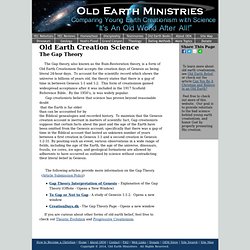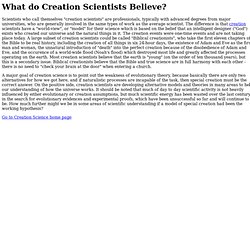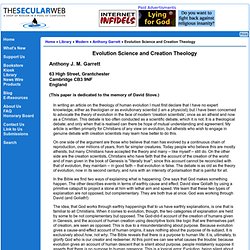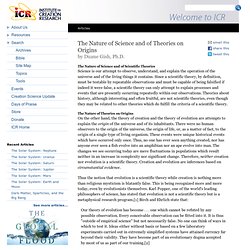

The Creation of Universe. The Creation of Universe. Old Earth Creation Science, The Gap Theory. The Gap theory, also known as the Ruin-Restoration theory, is a form of Old Earth Creationism that accepts the creation days of Genesis as being literal 24-hour days.

To account for the scientific record which shows the universe is billions of years old, the theory states that there is a gap of time in between Genesis 1:1 and 1:2. This form of creationism gained widespread acceptance after it was included in the 1917 Scofield Reference Bible. By the 1950's, is was widely popular. Gap creationists believe that science has proven beyond reasonable doubt that the Earth is far older than can be accounted for by the Biblical genealogies and recorded history. The following articles provide more information on the Gap Theory.
(Article Submission Policy) Gap Theory Interpretation of Genesis – Explanation of the Gap Theory (Offsite - Opens a New Window) To Gap or Not to Gap - A study of Genesis 1:1-2. Share This Page Feel free to check out more of this website. Creationism and Creation Science. What do Creation Scientists Believe? Scientists who call themselves "creation scientists" are professionals, typically with advanced degrees from major universities, who are generally involved in the same types of work as the average scientist.

The difference is that creation scientists have a "world-view", or "model" for their science which is based on the belief that an intelligent designer ("God") exists who created our universe and the natural things in it. Evolution Science and Creation Theology. 63 High Street, Grantchester Cambridge CB3 9NF England (This paper is dedicated to the memory of David Stove.)

In writing an article on the theology of human evolution I must first declare that I have no expert knowledge, either as theologian or as evolutionary scientist (I am a physicist); but I have been concerned to advocate the theory of evolution in the face of modern 'creation scientists', once as an atheist and now as a Christian. This debate is too often conducted as a scientific debate, which it is not. It is a theological debate; and only when that is realised can there be hope of mutual understanding and agreement.
The Nature of Science and of Theories on Origins. The Nature of Science and of Scientific Theories Science is our attempt to observe, understand, and explain the operation of the universe and of the living things it contains.

Since a scientific theory, by definition, must be testable by repeatable observations and must be capable of being falsified if indeed it were false, a scientific theory can only attempt to explain processes and events that are presently occurring repeatedly within our observations. Theories about history, although interesting and often fruitful, are not scientific theories, even though they may be related to other theories which do fulfill the criteria of a scientific theory. What are scientific theories of creation?
I don't know that you can put the Biblical account of Creation into a framework that would be acceptable to empirical testing and observations used in modern science...it was a super-natural event beyond the means to be tested just as the conditions prior to the Big Bang are unobservable and defy all known laws of physics..

All one can do is observe the evidences and see what they are most consistent with...special Creation or naturalistic, evolutionary origins....and they seem to point to special Creation. According to the Bible, God "spoke" all things into existence around 6000 years ago and a scientific case can be made that there are many evidences which agree with that if one removes naturalistic assumptions which guides much of modern science. Beginning of the Universe - Beginning of Time. Dinesh D'Souza, debate at Tufts University (2007).

Used by permission. Nothing we observe today existed prior to that exact moment. Further, it was something outside of time, outside of space, and outside of matter that caused all of this to come into existence. The realization that our universe started, and did not always exist, brings enormous challenges to nontheistic scientists. Are scientists certain of this Big Bang Theory? In this point of origin, all the mass in the universe was compressed into a single point of infinite density...smaller than a single atom.2 Then in a cosmic explosion--the Big Bang--the universe came into being.
This eerily parallels the record, "In the beginning, God created the heavens and the earth...and God said, 'Let there be light,' and there was light. "4 It came about not from matter, but from pronouncement. Stephen Hawking says universe not created by God. Origins of the Universe, Big Bang Theory Information, Big Bang Facts, News, Photos. The most popular theory of our universe's origin centers on a cosmic cataclysm unmatched in all of history—the big bang. This theory was born of the observation that other galaxies are moving away from our own at great speed, in all directions, as if they had all been propelled by an ancient explosive force.
Before the big bang, scientists believe, the entire vastness of the observable universe, including all of its matter and radiation, was compressed into a hot, dense mass just a few millimeters across. This nearly incomprehensible state is theorized to have existed for just a fraction of the first second of time. Big bang proponents suggest that some 10 billion to 20 billion years ago, a massive blast allowed all the universe's known matter and energy—even space and time themselves—to spring from some ancient and unknown type of energy.